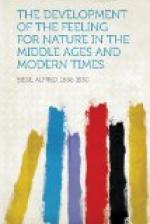[Footnote 9: Comp. Jacob von Falke, ‘Der englische Garten’ (Nord und Sued, Nov. 1884), and his Geschichte des modernen Geschmacks.]
[Footnote 10: Dessins des edifices, meubles, habits, machines, et utensils des Chinois, 1757.]
CHAPTER X
[Footnote 1: ‘Die Alpen im Lichte verschiedener Zeitalter,’ Sammlung wissenschaftlicher Vortraege, Virchow und Holtzendorff. Berlin, 1877.]
[Footnote 2:
Geschaefte Zwang und Grillen Entweihn
nicht diese Trift;
Ich finde hier im Stillen Des Unmuts Gegengift.
Es webet, wallt, und spielet, Das Laub
um jeden Strauch,
Und jede Staude fuehlet Des lauen Zephyrs
Hauch.
Was mir vor Augen schwebet Gefaellt und
huepft und singt,
Und alles, alles lebet, Und alles scheint
verjuengt.
Ihr Thaeler und ihr Hoehen Die Lust und
Sommer schmueckt!
Euch ungestoert zu sehen, Ist, was mein
Herz erquickt.
Die Reizung freier Felder Beschaemt der
Gaerten Pracht,
Und in die offnen Waelder Wird ohne Zwang
gelacht....
In jaehrlich neuen Schaetzen zeigt sich
des Landmanns Glueck,
Und Freiheit und Ergoetzen Erheitern seinen
Blick....
Ihm prangt die fette Weide Und die betante
Flur;
Ihm gruenet Lust und Freude Ihm malet
die Natur.’]
[Footnote 3: Litteratur geschichte.]
[Footnote 4: Saemtliche poetische Werke, J.P. Uz. Leipzig, 1786.]
[Footnote 5: Saemtliche Werke. Berlin, 1803.]
[Footnote 6: Saemtliche Werke, J.G. Jacobi, vol. viii. Zurich, 1882.]
[Footnote 7: He said of his garden at Freiburg, which was laid out in terraces on a slope, that all that Flora and Pomona could offer was gathered there. It had a special Poet’s Corner on a hillock under a poplar, where a moss-covered seat was laid for him upon some limestone rock-work; white and yellow jasmine grew round, and laurels and myrtles hung down over his head. Here he would rest when he walked in the sun; on his left was a mossy Ara, a little artificial stone altar on which he laid his book, and from here he could gaze across the visible bit of the distant Rhine to the Vosges, and give himself up undisturbed to his thoughts.]




